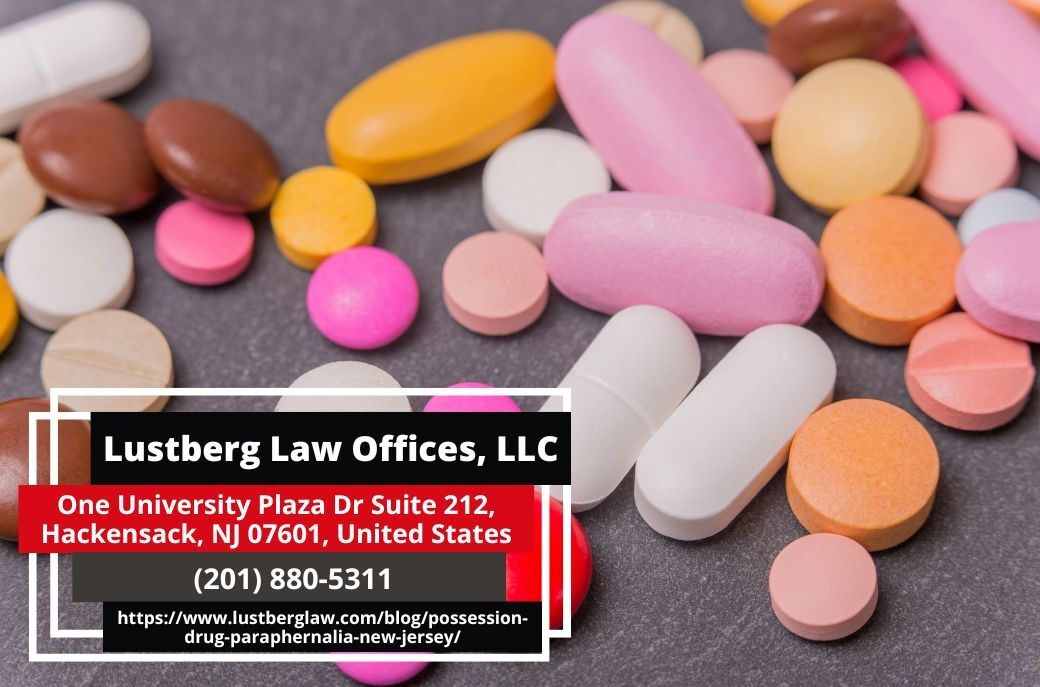New Jersey drug paraphernalia possession lawyer Adam M. Lustberg (https://www.lustberglaw.com/blog/possession-drug-paraphernalia-new-jersey/) is addressing the legal concerns tied to drug paraphernalia charges in the state. Drawing from New Jersey statutes and his work at Lustberg Law Offices, LLC, Adam M. Lustberg discusses how individuals can face serious legal consequences even without possessing controlled substances. The law’s broad application means that residents can be charged with possession based solely on residue or association with items considered to be drug paraphernalia.
The criminal justice system in New Jersey classifies possession of drug paraphernalia as a disorderly persons offense. According to New Jersey drug paraphernalia possession lawyer Adam M. Lustberg, this type of charge may lead to fines of up to $1,000, jail time of up to six months, and a suspension of a driver’s license for as long as two years. Legal representation plays a critical role in navigating these charges and minimizing long-term consequences, especially when paraphernalia possession charges are used to enhance or leverage other drug-related cases.
In cases where individuals are accused of possessing drug-related items such as glass pipes, rolling papers, syringes, or digital scales, the law evaluates intent and context. New Jersey drug paraphernalia possession lawyer Adam M. Lustberg explains that even clean items with no drug residue may be considered paraphernalia if their design or proximity to other drug-related evidence suggests illegal use. He emphasizes that context, including statements made by the individual, proximity to drugs, and even advertising materials, can influence how an item is judged in court.
The legal code, specifically N.J.S.A. 2C:36-2, addresses use or possession with intent to use paraphernalia. This statute outlines that individuals can be charged for possessing items intended to ingest, store, prepare, or introduce illegal substances into the body. The exception lies in the use of paraphernalia for marijuana or hashish, where the law is more lenient, but only under specific property conditions. These nuances mean that individuals can face legal action even if the item in question was not being used at the time of discovery.
Crucially, the law distinguishes between actual and constructive possession. Adam M. Lustberg notes that individuals do not need to be physically holding paraphernalia to be charged. Constructive possession can apply when someone is aware of the object and has the ability and intent to control it. This means someone can face charges if paraphernalia is found in a space they occupy, like a car or residence, even in their absence.
Adam M. Lustberg underscores that even trace amounts of residue can be enough to prompt charges under New Jersey law. He clarifies that the state’s Controlled Dangerous Substances Act makes it illegal to knowingly possess any amount of a controlled substance, including residues. This legal stance can increase the risk of dual charges—one for residue and one for the paraphernalia that contains it.
There are, however, legal defenses that may reduce or dismiss these charges. Adam M. Lustberg provides examples of common defenses, including proving legal use of the paraphernalia or demonstrating a violation of civil rights during the search or arrest. He highlights, “If the defendant’s arrest and the circumstances leading to it have involved an illegal violation of their civil rights, they may be able to have their charges dismissed.” Violations could include illegal searches, coercive interrogations, or entrapment tactics used by law enforcement.
New Jersey courts also provide alternatives for first-time offenders. For those charged solely with drug paraphernalia possession, the Conditional Discharge program may allow a defendant to avoid a conviction by completing a probationary period free of any additional legal violations. For more serious cases, Pretrial Intervention (PTI) may be an option. Adam M. Lustberg explains that successful completion of these programs can lead to dismissed charges and a clean criminal record.
The legal consequences of drug paraphernalia possession in New Jersey extend far beyond immediate penalties. A conviction can impact employment, education, and personal freedom. Prosecutors often use these charges in conjunction with other drug-related allegations to build a stronger case, increasing the stakes for defendants. Adam M. Lustberg’s legal work focuses on identifying weaknesses in the prosecution’s case and advocating for reduced penalties or complete dismissal.
Those facing charges related to drug paraphernalia possession are encouraged to understand their rights and consider their legal options. Adam M. Lustberg and the team at Lustberg Law Offices, LLC offer strategic defense planning to help clients mitigate the impact of these allegations. Building a defense early and consulting with a lawyer familiar with the specific details of New Jersey’s drug laws may be the best step toward resolving the situation with minimal long-term effects.
About Lustberg Law Offices, LLC:
Lustberg Law Offices, LLC is a criminal defense law firm serving clients across New Jersey. Led by attorney Adam M. Lustberg, the firm handles a wide range of drug-related charges, including paraphernalia possession, trafficking, and other controlled substance cases. The legal team provides guidance on navigating charges, developing defense strategies, and pursuing alternative resolutions when available under state law.
Embeds:
Youtube Video: https://www.youtube.com/watch?v=LdSDUQsVxQs
GMB: https://www.google.com/maps?cid=17248268094099978177
Email and website
Email: alustberg@lustberglaw.com
Website: https://www.lustberglaw.com/
Media Contact
Company Name: Lustberg Law Offices, LLC
Contact Person: Adam M. Lustberg
Email: Send Email
Phone: (201) 880-5311
Address:One University Plaza Dr Suite 212
City: Hackensack
State: New Jersey 07601
Country: United States
Website: https://www.lustberglaw.com/





